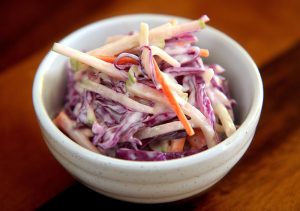Bulletin #4074, Nutrition for Maine Seniors: Vegetables for Health

For information about UMaine Extension programs and resources, visit extension.umaine.edu.
Find more of our publications and books at extensionpubs.umext.maine.edu.
What comes in all shapes, colors and sizes, and can help prevent cancer, heart disease and obesity? The answer is not some magic diet pill, but vegetables! Yet half of all Americans eat no vegetables other than potatoes, green beans, or salad. This is too limited. Here are some reasons why Americans should add more vegetables to their diet.
1. Vegetables are low in calories.
About one-third of the people in the United States are overweight. To lose weight, eat fewer calories and increase your level of activity. Using vegetables in main dishes and snacks can help you lose weight.
2. Vegetables are low in fat and have no cholesterol.
Americans eat too much fat. A high-fat diet raises your chance of getting heart disease and some kinds of cancer. Vegetables, on the other hand, are very low in the kind of fat linked to heart disease. Many foods from animals contain cholesterol. Eating these animal products may increase the cholesterol in your blood and raise your risk of heart disease. Since vegetables contain no cholesterol, eating them can help prevent this killer disease.
3. Vegetables are low in sodium.
Sodium is found in salt and many other foods. Too much sodium can cause high blood pressure in some people. Fresh vegetables contain very little sodium. In general, frozen vegetables have more sodium than fresh vegetables do, and canned vegetables have even higher levels. Check food labels to find foods with the lowest amount of sodium.
4. Vegetables are high in vitamins and minerals.
Dark green and orange vegetables help protect against cancer of the throat and lungs. These vegetables contain beta-carotene, a pigment which is turned into vitamin A by the body. Foods high in beta-carotene can help prevent cancer. This group of vegetables includes carrots, winter squash, spinach, broccoli, sweet potatoes, and kale.
Many vegetables are also high in vitamin C, and can help prevent cancer of the throat and stomach. Those rich in vitamin C include peppers, cabbage, cauliflower, broccoli, Brussels sprouts, tomatoes, and collard greens.
Some vegetables are very good sources of the mineral iron. Iron is needed to build blood and provide energy. Too little iron in the diet can cause anemia. Iron is highest in spinach, peas, lima beans, black-eyed peas, beet greens, and whole potatoes.
Dark green vegetables, such as spinach, mustard greens, broccoli, and cabbage, are high in calcium. Calcium is needed for healthy bones and teeth, and can help prevent the bone-thinning disease osteoporosis.
5. Vegetables in the cabbage and mustard family have extra health value.
This family of vegetables includes cabbage, broccoli, cauliflower, Brussels sprouts, kale, and mustard greens. These vegetables are called cruciferous because their flowers resemble a cross. These vegetables can help lower the risk of colon, stomach, and lung cancer.
6. Vegetables are high in fiber.
Fiber is the part of plants that cannot be digested or absorbed by the body. A high-fiber diet may protect against colon cancer. All vegetables are sources of fiber. It is best to get fiber from food, rather than taking pills or other supplements. Too much fiber can make it harder for your body to absorb many nutrients, including iron.
Lower-Fat Apple Coleslaw
6 ounces coleslaw
1/3 cup raisins
1/8 teaspoon salt (optional)
2 Tablespoons fat-free mayonnaise
3 Tablespoons plain nonfat yogurt
2 apples, cored and coarsely shredded
- Combine all ingredients except apples in a mixing bowl and mix gently.
- Stir in apples.
Serve at room temperature or chilled.
In cooperation with The Maine Nutrition Network, a partner with Maine Department of Human Services, Bureau of Health.
Information in this publication is provided purely for educational purposes. No responsibility is assumed for any problems associated with the use of products or services mentioned. No endorsement of products or companies is intended, nor is criticism of unnamed products or companies implied.
© 2001, 2006
Call 800.287.0274 (in Maine), or 207.581.3188, for information on publications and program offerings from University of Maine Cooperative Extension, or visit extension.umaine.edu.
In complying with the letter and spirit of applicable laws and pursuing its own goals of diversity, the University of Maine System does not discriminate on the grounds of race, color, religion, sex, sexual orientation, transgender status, gender, gender identity or expression, ethnicity, national origin, citizenship status, familial status, ancestry, age, disability physical or mental, genetic information, or veterans or military status in employment, education, and all other programs and activities. The University provides reasonable accommodations to qualified individuals with disabilities upon request. The following person has been designated to handle inquiries regarding non-discrimination policies: Director of Equal Opportunity and Title IX Services, 5713 Chadbourne Hall, Room 412, University of Maine, Orono, ME 04469-5713, 207.581.1226, TTY 711 (Maine Relay System).

